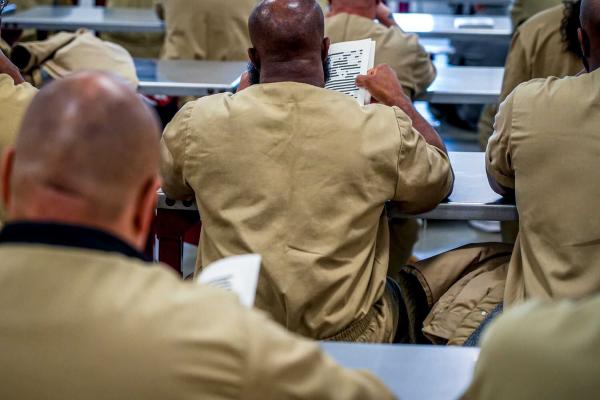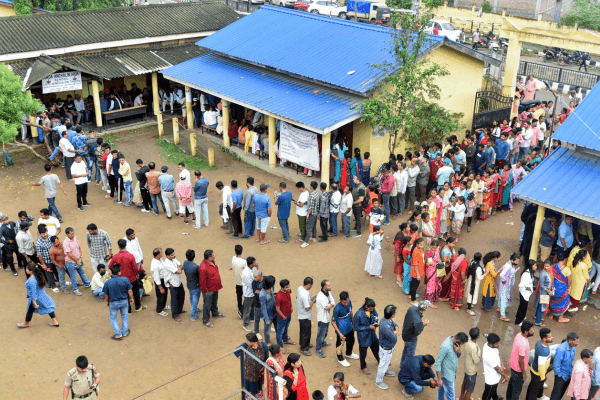At President Joe Biden’s inauguration, Rev. Leo O’Donovan, SJ, invoked the “Holy Mystery of Love” to be with us “as we dream together.”
“Help us under our new president to reconcile the people of our land, restore our dream, and invest it with peace and justice and the joy that is the overflow of love,” O’Donovan prayed on the Capitol steps.
In his prayer, O’Donovan quoted a prayer Archbishop John Caroll composed in 1789 for George Washington’s inauguration; however, the tradition of an inaugural prayer wasn’t officially instituted until the second inauguration of Franklin Delano Roosevelt in 1937.
In the following years, the inaugural prayer tradition boasted a religiously diverse lineup of faith leaders: At Franklin Roosevelt’s inauguration, a Catholic supporter of the New Deal joined a Protestant in prayer. Later, Harry Truman’s inauguration included the first Jewish rabbi; Dwight Eisenhower offered a prayer for himself, as well as prayers from a Greek Orthodox minister, a rabbi, a Catholic archbishop, and a Baptist pastor.
Richard Nixon held the record of the most prayers delivered at an inauguration with five inaugural faith leaders offering intercessions, until Donald Trump’s 2017 inauguration, during which six faith leaders delivered prayers.
While his ceremony included a rabbi and a Catholic archbishop, Trump's inaugural prayers were criticized for “religious intolerance” and for promoting the prosperity gospel.
Today’s inauguration included two inaugural prayers: an invocation delivered by Rev. Leo O’Donovan, SJ and a benediction delivered by Rev. Silvester Beaman. Both are longtime friends of and mentors to President Biden.
O’Donovan, a Jesuit and former president of Georgetown University, is now director of mission for the Jesuit Refugee Service USA. He presided over Beau Biden’s 2015 funeral, in which Beaman, the pastor of Bethel African Methodist Episcopal Church in Wilmington, Del., also participated.
Originally from Niagara Falls, N.Y., Beaman graduated from Wilberforce University, the first private historically Black university to be owned and operated by African Americans. Beauman was a friend of Beau Biden’s when Biden was the Delaware attorney general.
In 1992, at O’Donovan’s invitation, Biden spoke at Georgetown, where his son Hunter was a senior. Nearly 20 years later, O’Donovan shared with National Catholic Reporter the impression that Biden left on him:
“Gaudium et Spes speaks of the birth of a new humanism where people are defined by their responsibilities to their brothers and sisters and to history,” O’Donovan said. “That's Joe Biden."
Rev. Thomas Reese, SJ, a personal friend of O’Donovan and senior analyst at Religion News Service, offered similar praise. While Reese has expressed concerns about the inaugural prayer being politicized in the past, he had hoped that O’Donovan would incorporate an interfaith spirituality accessible to all Americans into his prayer today.
“O’Donovan is theologically sophisticated, ecumenical, and inter-religiously sensitive,” said Reese in advance of the inauguration ceremony. “It’s important that the inaugural prayer not be used as an opportunity for national aggrandizement … We should not be so arrogant as to think that we are always doing God’s will. We are a blessed people, but we are also a sinful people. Any prayer that we have should be a prayer that asks God for wisdom, for forgiveness, for the grace to do his will, which is to work for justice and peace and to serve all God’s children, especially the poor and the marginalized.”
Indeed, O’Donovan referred to the “Creator of All” in his prayer. He quoted scripture and also mentioned “American patriotism,” with a focus on love.
O’Donovan also quoted Pope Francis, reminding us “how important it is to dream together.” (Biden has met Pope Francis multiple times: When Biden won the election, Pope Francis called to congratulate him.)
“O’Donovan referencing peace and justice was reflective of the Jesuit tradition," Guthrie Graves-Fitzsimmons, fellow at the Center for American Progress, told Sojourners.
Mark Tooley, president of the Institute on Religion and Democracy, said that Biden’s choice of faith leaders is symbolic of Biden’s life and morals.
"The priest reminds us that Biden is only the second Catholic president in American history,” Tooley said. “The clergyman from the African Methodist Episcopal Church is a great choice in that he reminds us of the Black church tradition in American Christianity and politics.”
As Alissa Wilkinson wrote for Vox, “Fr. Leo O’Donovan’s invocation is a signal of Biden’s connection to his Catholic roots … Rev. Silvester Beaman’s benediction is a reminder that there’s work to be done.”
According to Tooley, both are essential to realizing the full spectrum of our democracy. Inaugural prayers, he told Sojourners, are a valuable part of American culture, as they “remind us that the government, including the president, are not the supreme authority.”
“There is a transcendent authority above the president-elect that commands their respect and good behavior and urges them to become good public servants,” Tooley said. “It also connects to America’s tradition of civil religion, which is a unifying force in that it allows people of all religious backgrounds to come together for a common purpose in our democracy.”
“Perhaps the prayers are more important now than they ever have been in their history. We are a country very divided and polarized. Obviously we have gone through a year of crisis and, in the last couple of weeks, an especially sharp crisis,” he continued.
“If you’re a person of faith, now is a good time for prayer.”
Got something to say about what you're reading? We value your feedback!







